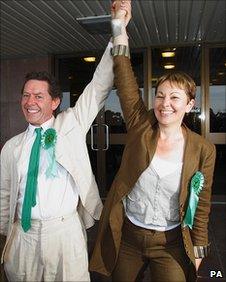Lucas insists lone Green voice counts in Parliament
- Published

The Green Party leader has ruffled a few feathers since becoming an MP
Can a lone MP oppose the government single handed?
The Green Party's sole member of the Westminster Parliament thinks so.
Nine months after her election, Caroline Lucas is styling her movement as the real opposition to the coalition.
That is quite a claim for a party that won just under 300,000 votes at the general election - considerably fewer than either UKIP or the BNP.
Caroline Lucas argues the job of opposing falls to her because Labour cannot fight selling off the Royal Mail or tuition fees having introduced those ideas in government.
At her party's spring conference in Cardiff she does not stint in her criticism of the prime minister's tour of the Middle East, during which he was accompanied by businessmen from defence and aerospace firms, saying: "The blatant opportunism of this visit is morally obscene."
But what sort of challenge can a single member mount with no fellow MPs, modest financial support and scarce hope of forming a government?
Ms Lucas admits it can be both hard and frustrating but tells her party: "Never forget one voice can make all the difference."
She has ruffled feathers since the election, calling for electronic voting in the Commons and setting up a group in Parliament campaigning for a withdrawal from Afghanistan.
She was, unsurprisingly, an early opponent of the government's abandoned plans for selling or leasing Forestry Commission land.
Drawing on her experience in the European Parliament, she has proved adept in the Commons chamber - securing a debate on changing the way Westminster works and making frequent, high profile interventions.
Grand ambition
This, though, is a party with ambitions of something grander than parliamentary competence.
Its proposals for cutting CO2 emissions by 10% every year until 2030 would transform the way Britain does business. Its supporters argue that sort of action is needed to save the planet.
But its opponents say it would cripple the economy.
The main barrier to the Green MP getting closer to achieving her goals is not the virtue or folly of her ideas but the parliamentary maths.
Had David Cameron decided to run a government without Liberal Democrat backing after the election - in which many votes would have teetered on a knife edge - Caroline Lucas's support would have been much courted.
In the Scottish Parliament, where the SNP runs a minority administration, the votes of the two Green members count.
At Westminster the coalition bloc means there is little hope of the Green MP swinging any given vote.
Ruth Fox, the director of the political research charity the Hansard Society, says a single MP can win attention for topics that might otherwise be ignored.
But she adds: "If you have a government with a substantial working majority no matter what issues they're raising they can't stop a bill, they can't force an amendment and they can't defeat the government."
It is little surprise then that there is much talk in the bar of the conference hotel about changing the electoral system.
'Voting compromise'
Two 'Yes to AV' campaigners sit at a desk in the foyer, largely untroubled by enthusiastic supporters.
Here, the party has been forced to compromise. It favours a form of proportional representation, with some seats in the Commons allocated on parties' share of the vote. Caroline Lucas argued that different voting systems should be on the ballot paper in the coming referendum.
But having lost that argument the party has agreed to support the Alternative Vote (AV) in the referendum campaign. It does so with little passion.
Despite Caroline Lucas's success, and a standing ovation that followed her speech equal in length and enthusiasm to those customary at bigger political rallies, the Greens are not getting carried away with the glamour of having a voice in the Commons.
A motion is proposed at their conference that would chill the heart of many an MP.
It suggests any Green MP should have their salary and expenses paid into an account managed by a local committee. The money would then be paid out depending on the committee and the MP's assessment of that member's "value".
Like many of the Greens' ideas it could definitely be described as radical, and is unlikely to be adopted as a national policy any time soon.